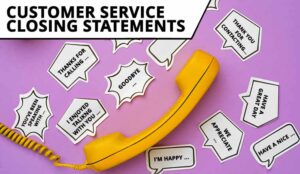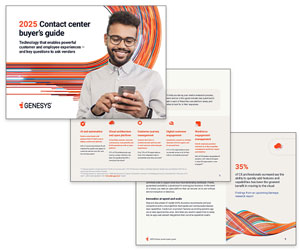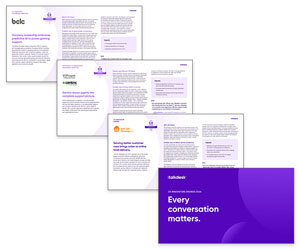Using customers’ names in a professional context can be a powerful tool for creating connection and trust – or it can backfire, coming across as overly familiar or inappropriate.
Should We Call Customers by Name? Should we call our customers Sir, or Madam? Should it be Mr or Mrs? Or should we be on first name terms?
Deciding whether and how to address a customer by name involves an approach that balances respect, formality, and personalisation, so we asked our readers for insights and practical considerations for navigating this delicate topic.
Why Names Matter in Customer Interactions
Addressing customers by name personalises the interaction, distinguishing it from a scripted or impersonal call. It signals attentiveness and care, making the customer feel valued.
“I do like it when people call me by my first name, although it really depends on who I’m interacting with. If it’s my bank teller, hair dresser or doctor, it just seems most appropriate to call me by my first name.
On the other hand, if I’m having an over the phone conversation with someone I don’t really know or have just been introduced to, such as a call centre rep or receptionist, I prefer that they address me by my last name unless, of course, I give permission later in the call.” – Monica Kay, a call centre helper reader
However, assuming familiarity by using a first name without permission can offend, particularly among older demographics or in formal scenarios like complaints.
Asking Customers for Their Preferred Name
One of the simplest and most effective strategies is to ask customers how they prefer to be addressed.
“Our advisors are coached to ask for their caller’s full name, and then how they prefer to be addressed. This puts the onus entirely on the caller and ensures that they are given the opportunity to dictate how they are addressed.
As such, the advisor does not need to worry about being too formal or informal and often feels more comfortable using the caller’s name, knowing they’re unlikely to offend.” – Sean Colledge, Training & Performance Manager at Office Response Ltd
This doesn’t have to be complicated and at the start of the call agents could simply:
- Start by asking for the full name: “May I ask your name?”
- Follow up with, “How would you like me to address you?”
This method not only shows respect but also makes the advisor’s job easier, as they can confidently use the chosen form of address.
Challenges with Using Customer Names
Difficult to Pronounce Names
Some advisors hesitate to use customers’ names if they find them difficult to pronounce.
As Christine (a team leader) explains, “I have recently asked some of our trainee agents why they haven’t used the callers name at all during a call. One of the reasons given was that if they couldn’t pronounce it; they were uncomfortable using the word Madam.
This hesitation is common, particularly among younger staff members. While using “Sir” typically doesn’t present a problem, addressing someone as “Madam” can feel more awkward.
“I advised them to explain to the caller that they couldn’t pronounce the name, as often the caller will then give you a first name.”
Formality in Complaints vs. Enquiries
Customer preferences regarding formality often depend on the nature of the interaction. In situations involving complaints, a more formal approach using titles such as “Sir” or “Mr.” is often appreciated, as it conveys respect and acknowledges the customer’s grievance.
Conversely, in scenarios like making inquiries, providing information, or purchasing, a casual and friendly tone using first names is generally more acceptable and can help create a relaxed atmosphere. Adjusting the tone based on the context can enhance the customer experience.
Age Demographics and Social Norms
Opinions on addressing customers by their first name often vary by age and social norms. Many younger customers (under 50) are comfortable with first names, while older customers (50 and above) often prefer formal titles like “Mr.” or “Mrs.,” viewing them as more respectful.
“I noticed recently that when I call my phone company the Customer Service Reps always ask if they can call me Steven.
Years ago when I was younger I would have said sure, but being 55 years old I don’t feel comfortable having a stranger address me by my first name. I always tell them to call me Mr. Schwartz.” – Steven J. Schwartz
However, others argue that formality should not be age-dependent. Some younger customers also find it presumptuous or even rude to be addressed by their first name without prior acquaintance or explicit consent.
As Rufus D said, “I am under 50 and I find it extremely rude and presumptuous to be called by my first name by someone I don’t know. I usually ask them not to call me by my first name.“
Listening for Cues
Often, customers provide subtle hints about their preferred form of address.
Luke Clarke, a Client Services Manager, suggests:
“In my contact centre I actively encourage my agents to make this choice. You can generally tell, from the way you are addressed by a customer, what is appropriate. Tone of voice is a big give away and listen to how they respond to your openings.
If you ask for their name and they respond with “Luke” then why not use that during the call, if they respond with “Mr Clarke” then use ‘Mr’ or ask them if they are comfortable with you using their first name. If you train them in soft skills empower them to use them.”
Empowering agents with soft skills training to interpret these cues can significantly enhance the customer experience.
For ways to train active listening to your agents, read our article: How to Train Active Listening in the Call Centre – With Exercises
Tailoring Approach to Individual Preferences
Each customer is unique, and a one-size-fits-all approach rarely works.
As Sean McIver explains, “It all boils down to what the customers feel comfortable with; our agents are encouraged to ask what the customer prefers when they ask for confirmation of name at the start of the call. The key is to try and make sure that customers are being treated in a manner that suits them.”
Older customers often value the respect implied by titles like “sir” or “madam,” while younger ones may be fine with first names, but preferences can vary widely. Listening to customers and adapting to their needs ensures the best results and demonstrates attentiveness.
Best Practices for Addressing Customers
- Ask for Preferences: Always start by asking the customer how they prefer to be addressed.
- Err on the Side of Caution: Use titles and surnames unless the customer indicates they’re comfortable with first-name terms.
- Be Transparent About Challenges: If a name is difficult to pronounce, acknowledge it and ask for clarification or permission to use a first name.
- Adapt Based on Context: Adjust your approach based on the nature of the call – formal for complaints, relaxed for sales or casual enquiries.
- Train Advisors to Listen and Adapt: Equip your team with soft skills to interpret customer cues and respond accordingly
If you are looking for more insights on how to provide the best customer service, read these articles next:
- Customer Service Skills: How to Improve Empathy, Active Listening and Knowledge
- Techniques to Improve Call Control Skills
- The Best Ways to Start and End a Customer Conversation
Author: Jo Robinson
Reviewed by: Hannah Swankie
Published On: 1st Aug 2012 - Last modified: 11th Dec 2024
Read more about - Skills, CX, Empathy, Rapport, Training




















